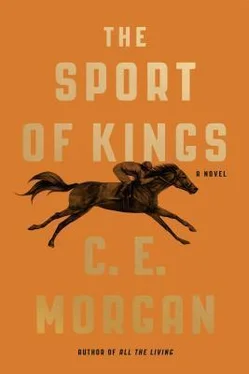Only later would she look back furiously and think of herself as some slave ordered about by a little boy who had just discovered he would be master someday, talking big at the kitchen girl, who obeyed him, not even stopping to snuff out the candle, just grabbing her jacket and a black goatskin purse she’d spent a week’s wages on. The door spun a draft that gutted the candle and left Henry in the darkness behind her.
Maryleen raced down the drive in a flat-out panic and onto the road toward Paris; it was only six fifteen; there was no one about and still no play of light on the eastern horizon. A sense of unreality enveloped her now as she hastened along; had those words really passed between them, had she just imagined the absence of Filip? But no, there’d been no egg bowl waiting, this was real and actually happening. Yet, surely she was overreacting; she tried to calm her mind, she didn’t really think anyone was coming after her, not really, there was no lynch mob waiting for the girl cook, though she glanced fearfully over her shoulder for headlights; yes, the boy was just messing with her, she was turning this into something it wasn’t, she just needed to calm down. But by the time she was approaching the outskirts of town, sweating through her blouse, she could almost see Filip hanging from a tree right before her eyes, and her decision was made. Later, she would realize there had been a sneaky joy smuggled into her fear, that she hadn’t been quite as afraid as she remembered, that she had forced her own panic like a hothouse flower to compel her stubborn spirit to the action for which it had always — always — been intended. What had she been thinking, turning down colleges and ending up in a white kitchen like that? What exactly had she been trying to prove? Or avoid?
Her own house was empty, her mother and father both at work. In the wallpapered room where she had grown up — odd how the ugly trellised pea-blossom paper would soon be a thing she remembered fondly — she shoved two outfits and her spare pair of shoes into an old fabric traveling bag, but then eyed the single line of mysteries on her shelf and removed the extra shoes, returning them to her nearly empty closet. Nine mysteries and her pocket Shakespeare fitted snugly into the bag, all that the space would allow. Quickly, she removed her sweaty clothing and shrugged into a loose-fitting black blouse and a rayon skirt that fell below her knees, identical to the other three sets she owned and under which no hint of a figure could be discovered. With that final task complete, she was down the steps and out of the old house, site of her father’s Bible reading, of her mother’s weariness, of her own bad-tempered childhood. She didn’t leave a note, she would call them from Lexington — no, Cincinnati; first she would leave this bloody borderland behind. She intended to apologize to Miss Martin for hanging up on her, but Miss Martin would understand — she loved her like a daughter; Maryleen knew that. Then as she was shutting the old walnut front door, bag in hand, she suddenly stopped, her swarming thoughts stilled, and she stood at her fullest height, fear vanishing. She didn’t know where the certainty came from or why, but she suddenly knew she was going to New York City, that she’d find a job in a restaurant and then figure it out from there, and she felt now that she didn’t have a moment to lose, that her very life depended on it.
* * *
Oh, Mr. Forge, is your son ill?
Yes, yes, he is.
When did he take ill?
Over the holidays. There was a fever in the house.
* * *
John Henry picked up his wife at the Paris train station. He waited on the platform, an utterly motionless figure. His affectless face was outperformed by the fine details of his wool pin-striped suit, his black silk overcoat, gold cuff links, and houndstooth handkerchief, his wedding band, which winked dully. Every hair on his graying head was arranged into a still life, and his absolute stillness was betrayed only by the redness of his ears. It was very cold out.
When the train arrived, it came without urgency, its whistle distorted by the distance, its black flashing brokenly through the trees; then came the falling rhythm of its deceleration, the whine and hush of brakes. When it finally stopped, John Henry half wanted it to roll on, carry her away and fail its engine somewhere else. His head turned abruptly, found the straight black tail of the locomotive and the people who poured from it. They were all embracing. Someone kissed someone. He found their displays vulgar and invasive and turned away. Then she was there, standing hesitantly on the last step, blonde and pale, looking at him with all the native shyness he remembered from when they first met eighteen years ago. The wife of his youth, looking no worse for her obvious wear. He stepped forward, his cold hands helping her to navigate the last step onto the platform. He grasped up her suitcase. His other hand made a small, solicitous gesture at the small of her back. His father, Jacob Ellison Forge, had told him that a woman’s bones were lighter than a man’s — and may my words alone be a lesson to you in that regard. Only an animal visibly damages its mate.
They drove home in their usual silence made newly entire; they drove in the tame light of dusk and the aseptic chill. John Henry tried not to think of anything, but watched the thrifty sky as it diminished into evening, a sky like middle age, without eagerness or gladness, without the bright light and heat of youth. His wife shifted on the seat beside him. The motion caught his eye, and he looked at her as he pulled the sedan up the drive. She was looking at the house he had given her — she came from a family that had more name than money — in wonder or regret or some other unjustifiable female emotion. When she made a tiny mouselike motion to open the door for herself as if he would not do it for her, as if she had forgotten in her time away that it was the husband’s place to open the door for his wife, as if in her absence their marriage had ended, this was too much, and he suddenly reached over and placed one hand firmly against the back of her head. Without explanation, he pressed her head forward toward the dashboard, feeling her resist only for a moment, her left hand darting up once the way her heartbeat would flutter lightly when they made love, then he took up her pocketbook and landed three hard blows against her head, high enough on the back of the skull so the bruise would not show and where there was no danger of breaking her neck. She made no noise but a grunting exhalation with each blow, her shoulders shrinking up around her ears. Then he flung the pocketbook onto her lap and used both hands to turn her now, so that she could see his lips as he said, “Your son is sick. Go tend to him.”
And that would have been it. Except that she cried. They had already come into the house, John Henry following after her with her suitcase and pointing her upstairs, as though she were a child. She had walked up the stairs gripping the walnut banister, but then stumbled awkwardly on the last one, looking back down at him with fear wrinkling up her face, and he saw tears on her cheek. Despite her actions, her guilt, what she had done to him, despite the fact that her wet little tongue had no doubt licked the rotten fruit before she had taken it in her mouth and swallowed it, here she stood, crying, and the naïve innocence of her look, which was at best a lie and at worst cuckoldry, made a mockery of his strict dignity, his family, of his manhood. The high heat of rage flooded him instantaneously. He rushed the stairs like a bull, and for a moment Lavinia could only stare in alarm, never having seen him wholly uncontained, before she turned and fled down the hallway, and he realized she planned to escape him by rushing into their son’s room — his son’s room! He overcame her as she was reaching for the door, twisting her under him, his hands like manacles on her wrists. He dragged her to their room and kicked the door shut, beyond caring about the clatter they made or their heavy breathing. Her strained grunting and struggling only aroused him, and he unleashed himself. He forced her face-first onto the bed with her arms folded against her chest and struck her with his open hand against the back of her head with increasing force until she mewled into the bedspread. Forcing her tweed skirt above her hips, he was stymied by a hard white girdle and belts and straps and stockings so tight around her — like a chastity belt — that his fingernails scratched her as he ripped them down from her hips. He didn’t say anything, there was no need, she understood absolutely nothing of him anyway even after all these years, so this was both his farewell address and a reconfiguration of his vows. He dropped his trousers and shorts and, hard with the potency of his anger, he forced himself into her dry, the rude, fleshy slap of his hips beating against her flanks. He breathed like a gladiator as he stared down at the back of her deceitful head. But when she shifted under him once in pain, he shuddered with pleasure, and, against his will, he remembered suddenly their youthful coming together with a vibrancy like lightning, and he paused midthrust, panting, blinded by the memory of it — the plangency of old delight, of her lost charms, how her eyes had once admired him. But she had changed and turned away and made a fool of him, and he had wasted the energy of his adult life on her luster; it was not so much that he hated her now, but that he respected himself. And with that thought, he was moving again, stabbing into her, fast and with no feeling now, not even anger, in a strict charade of lovemaking again and again in the old, rote motions again and again until she cried out, but not in pleasure.
Читать дальше
Конец ознакомительного отрывка
Купить книгу












